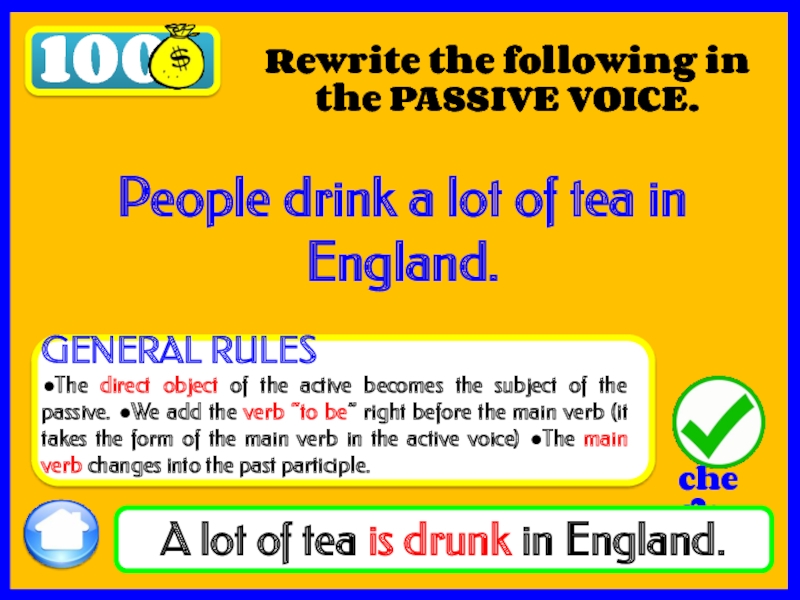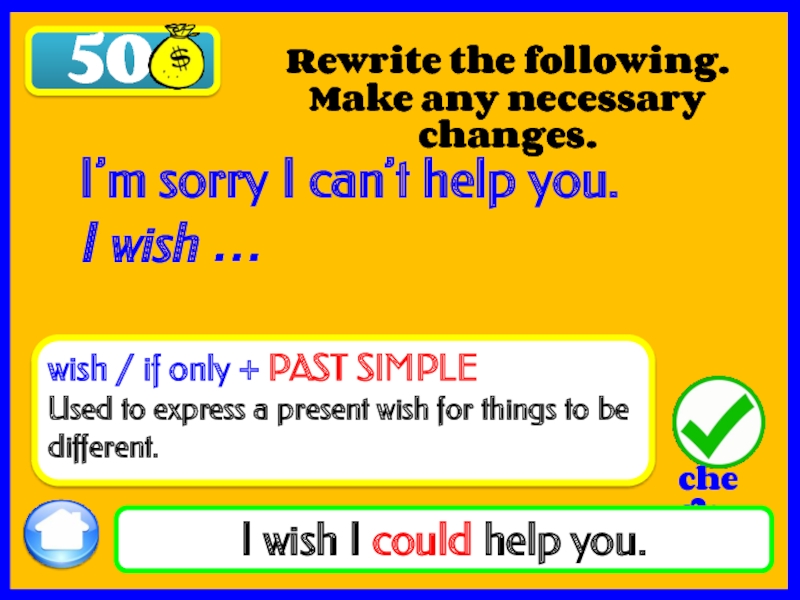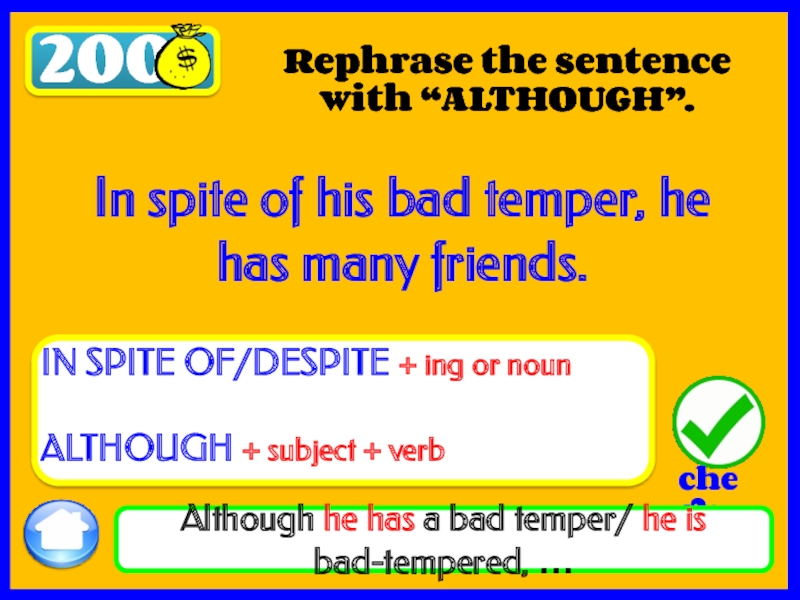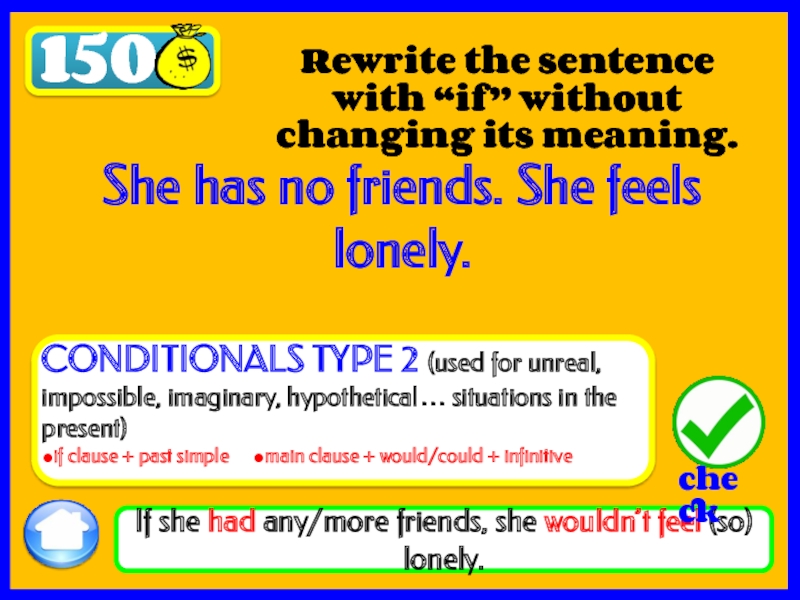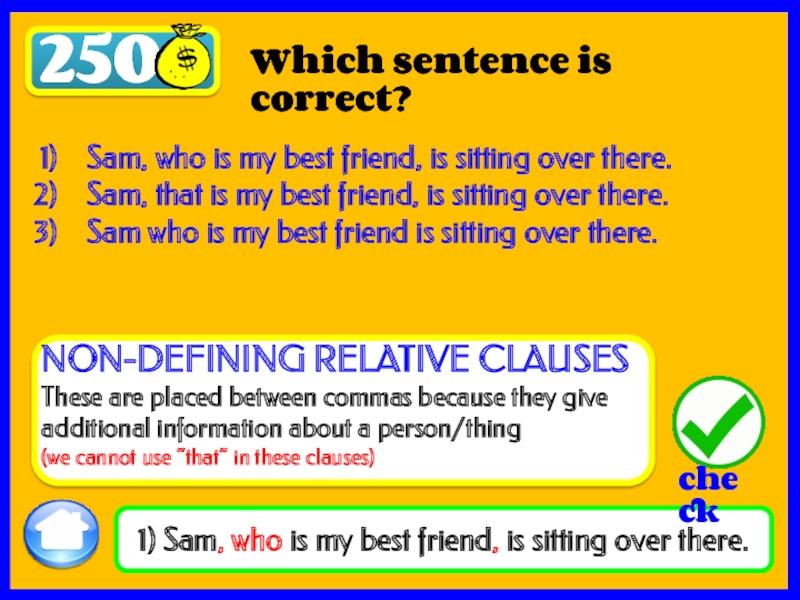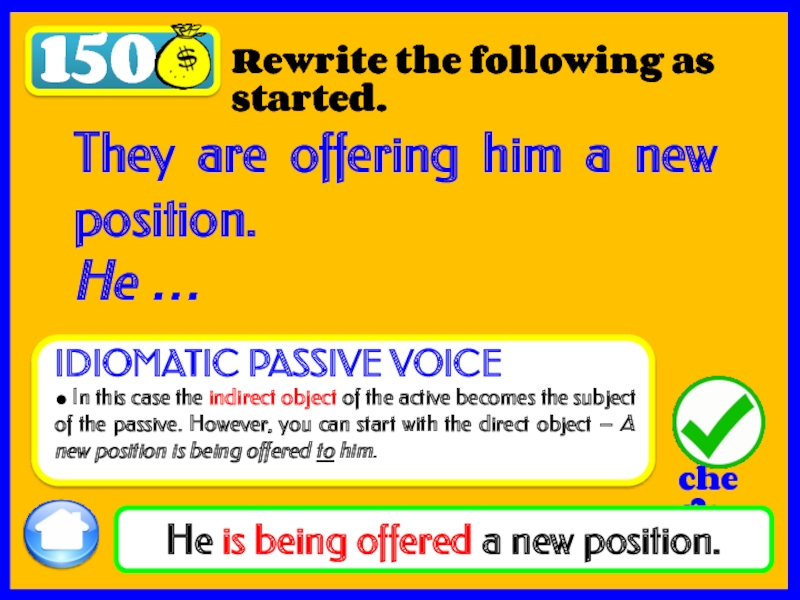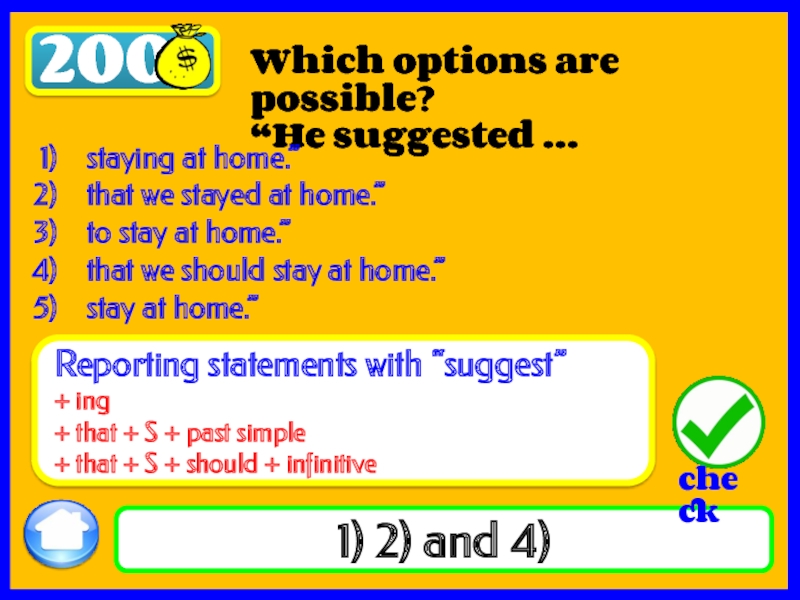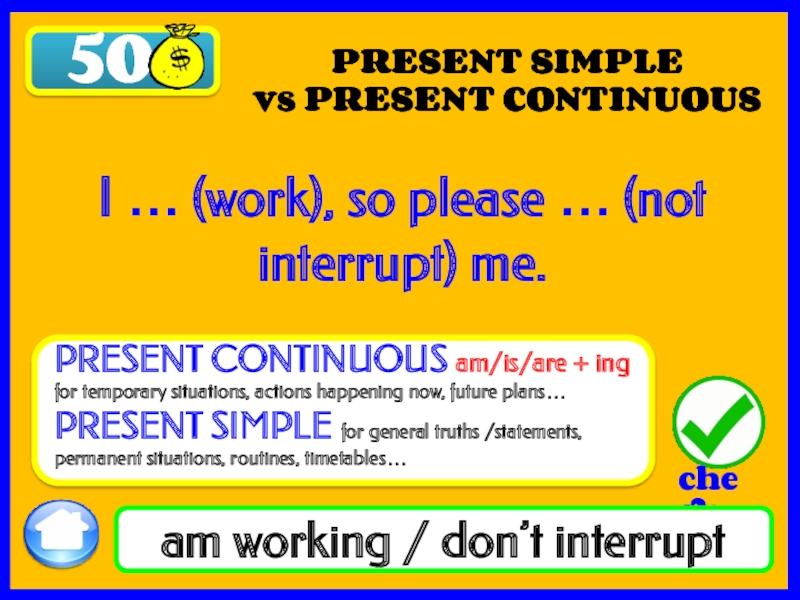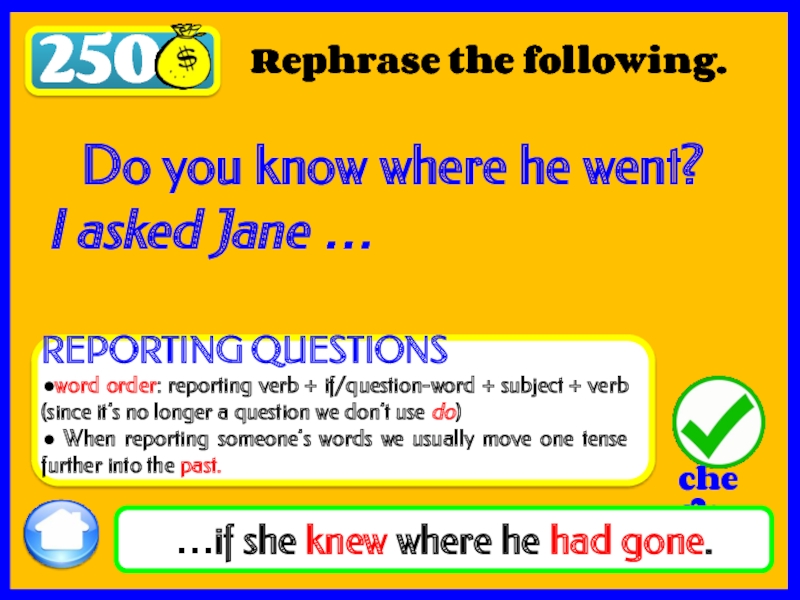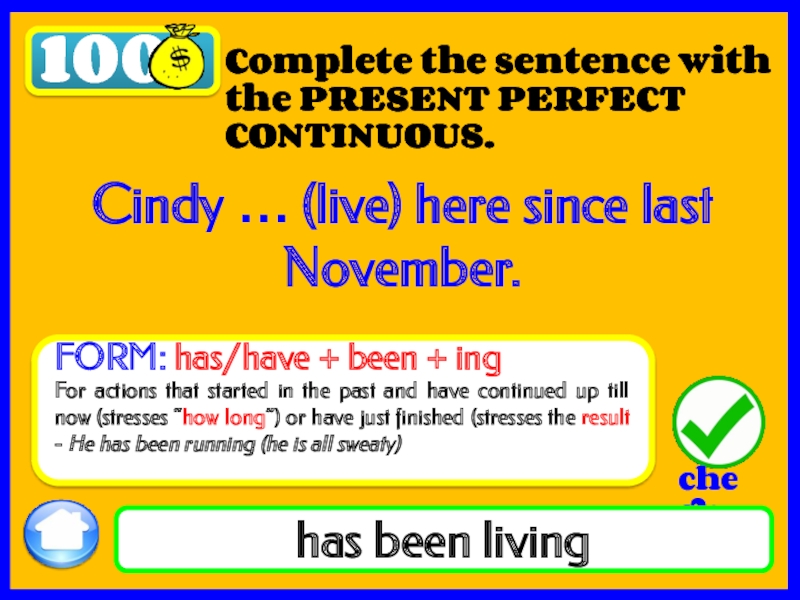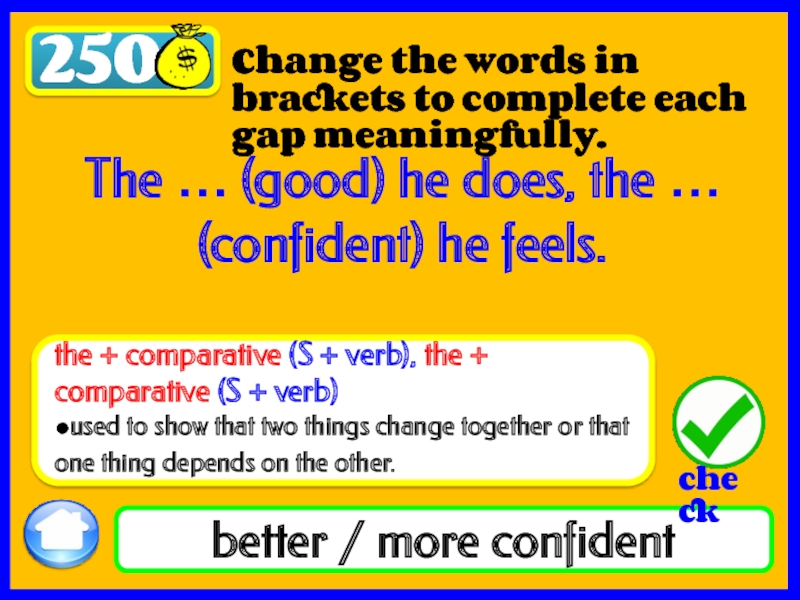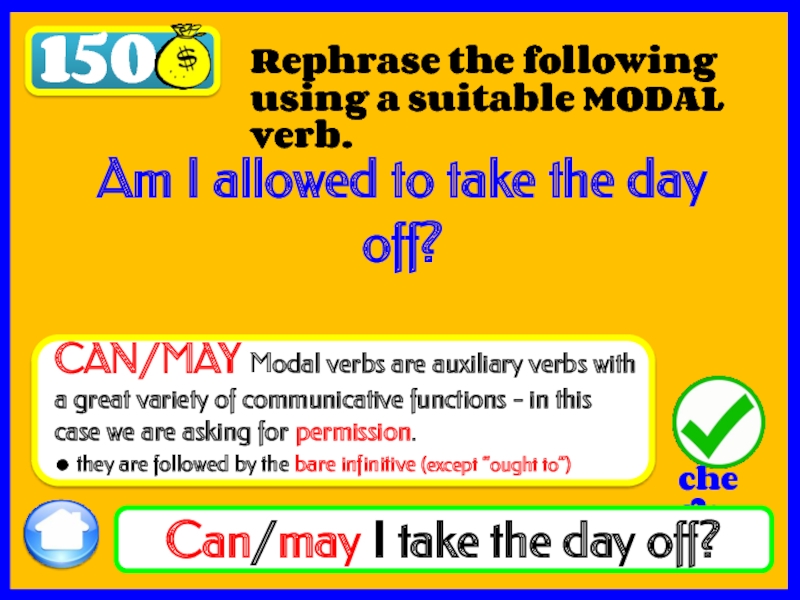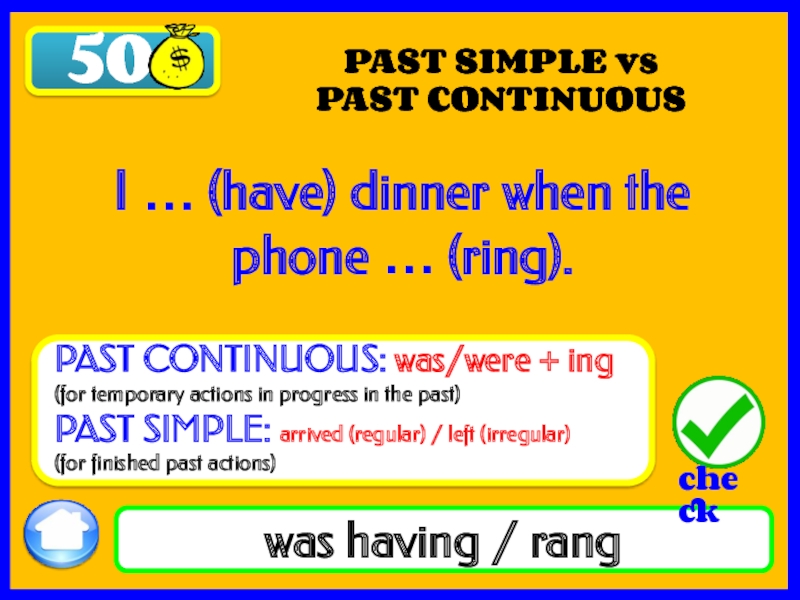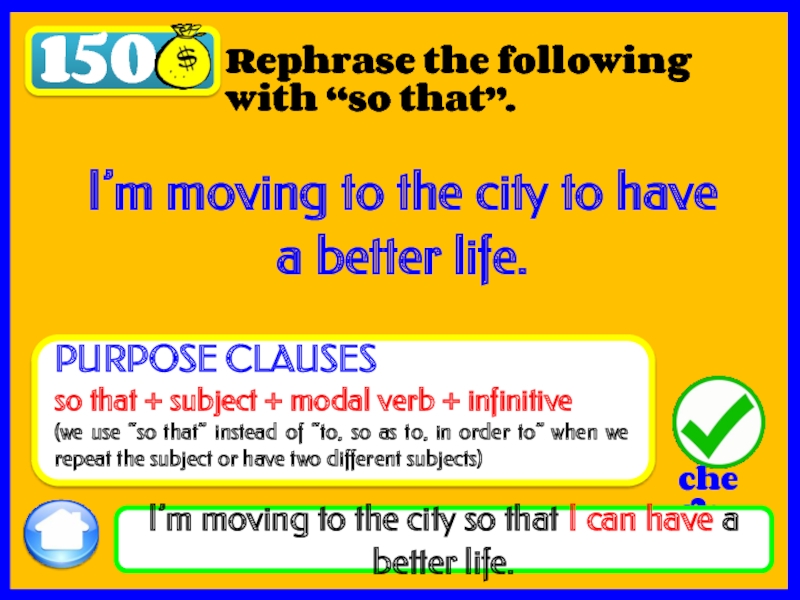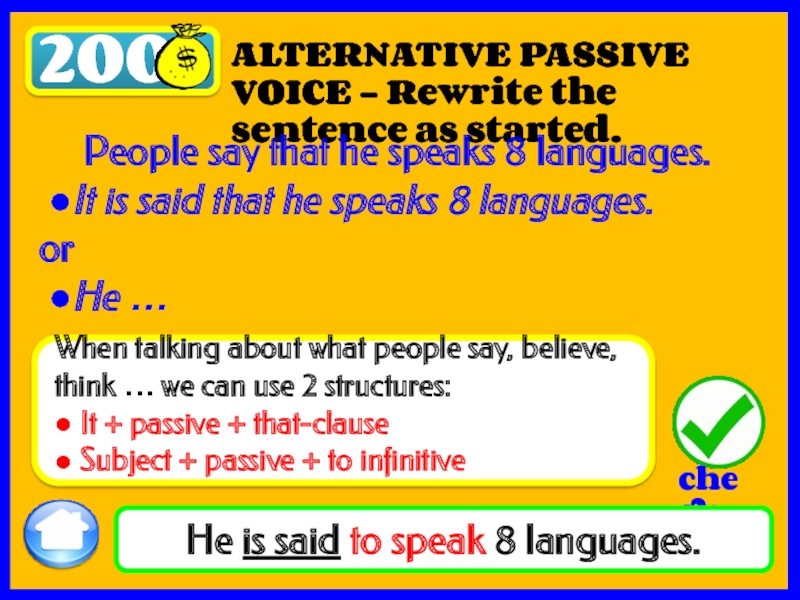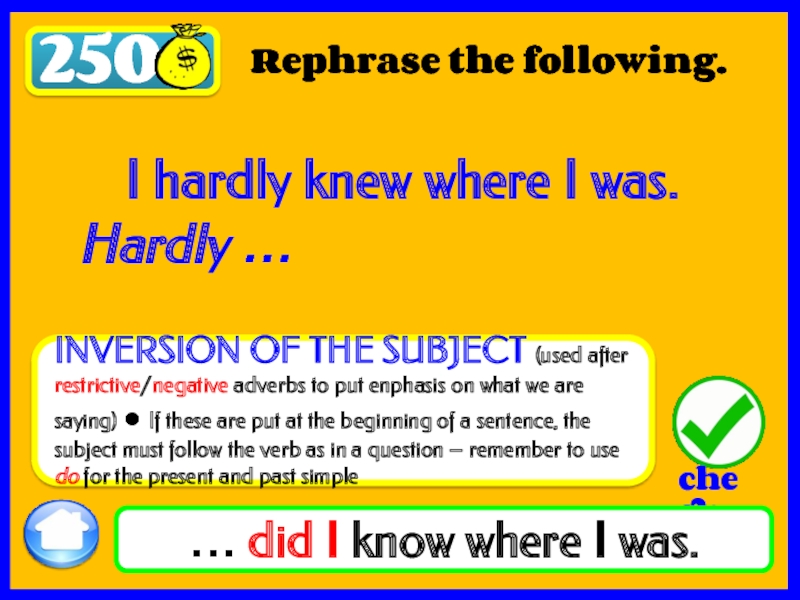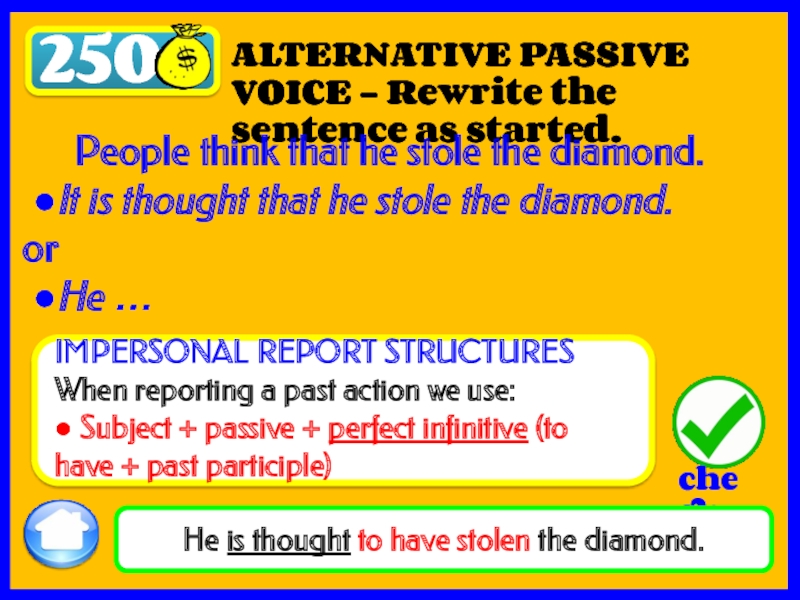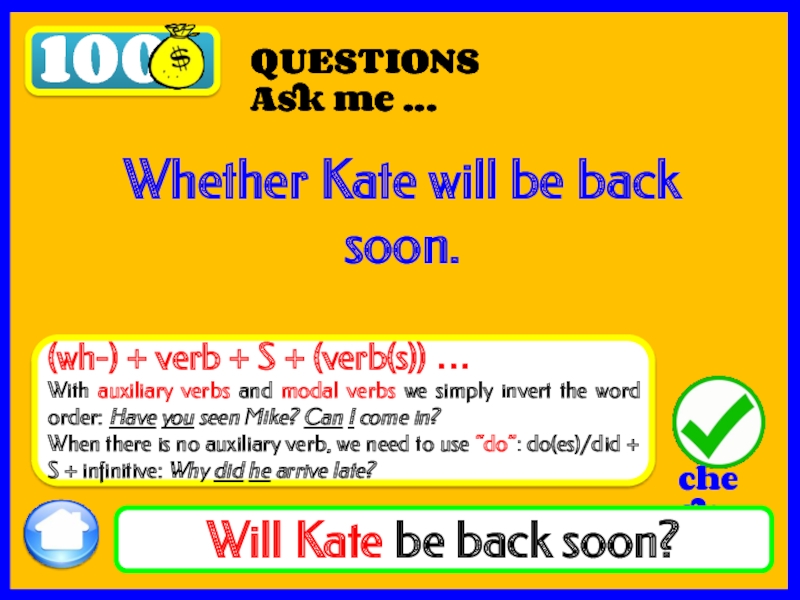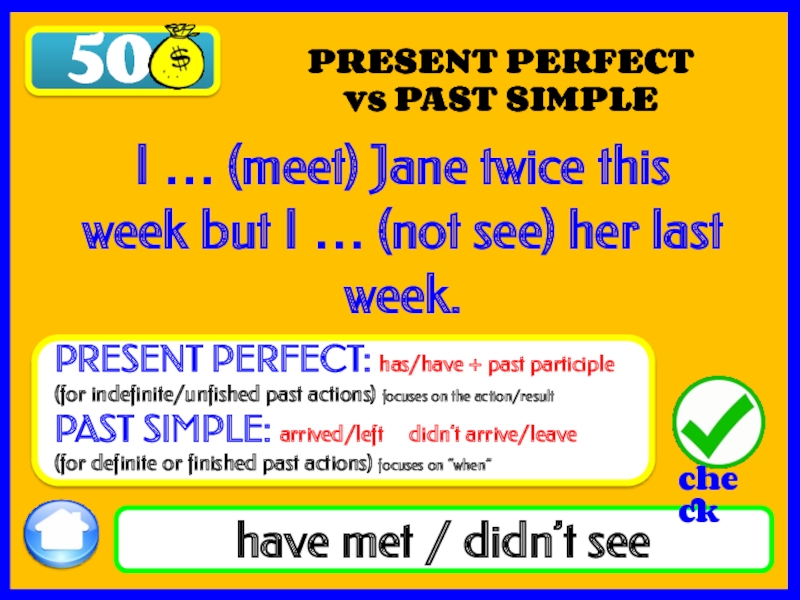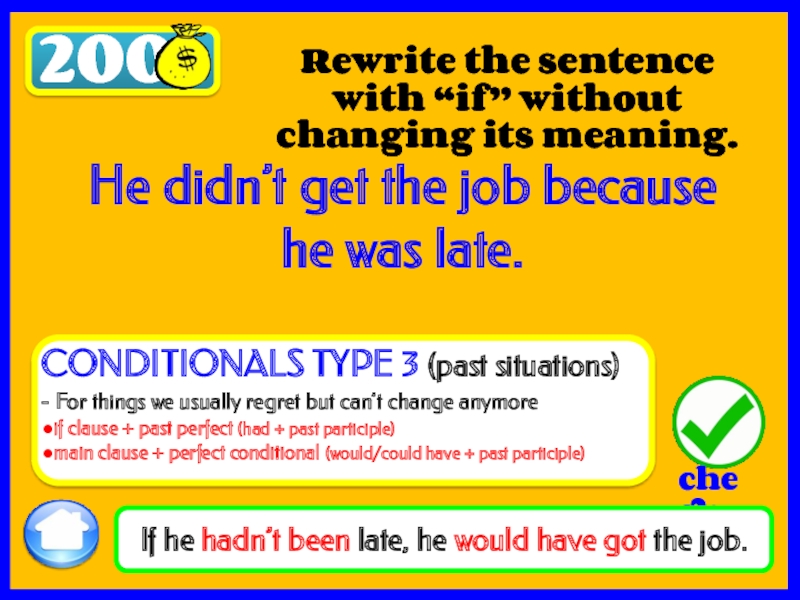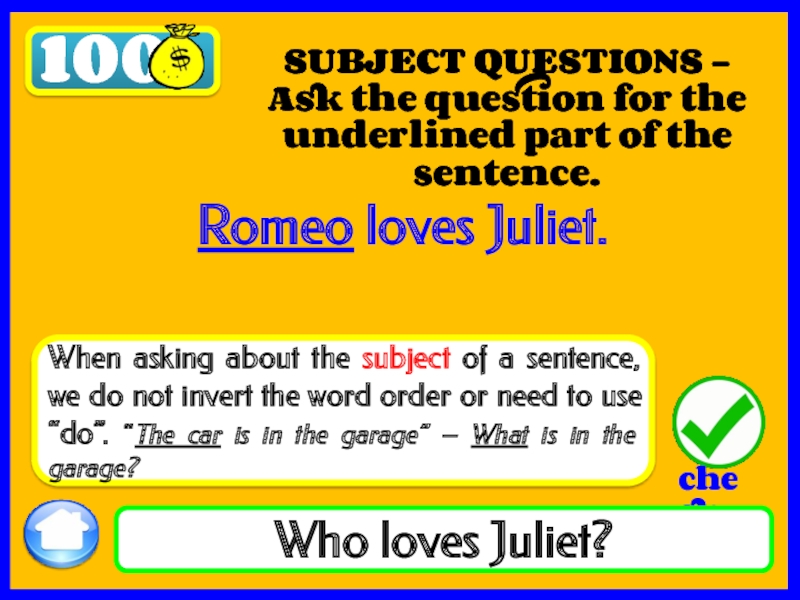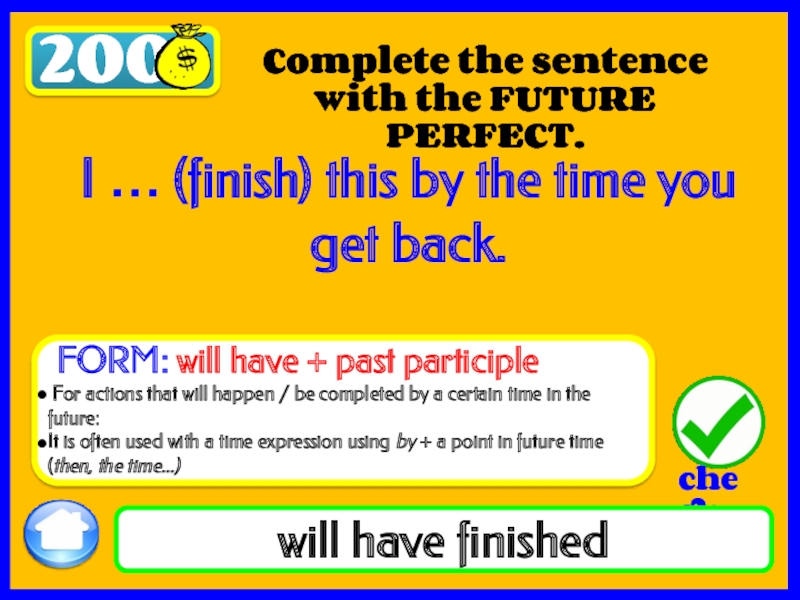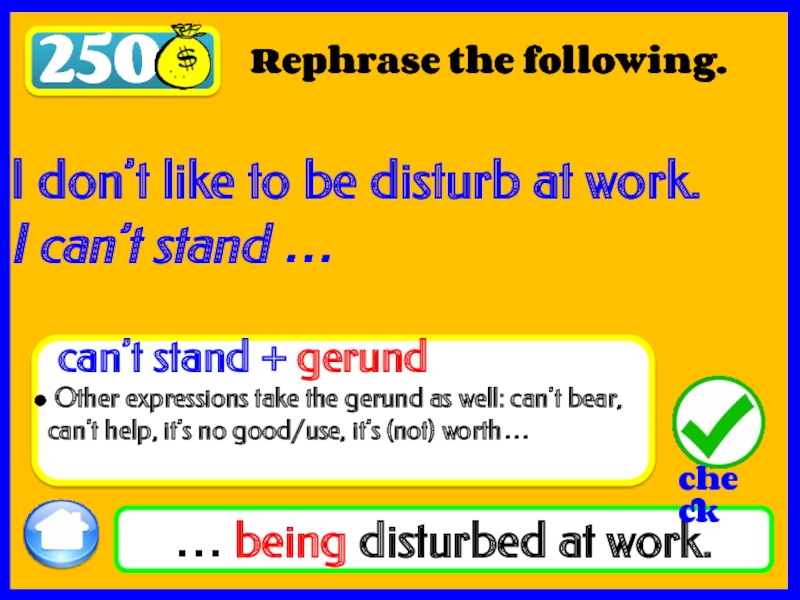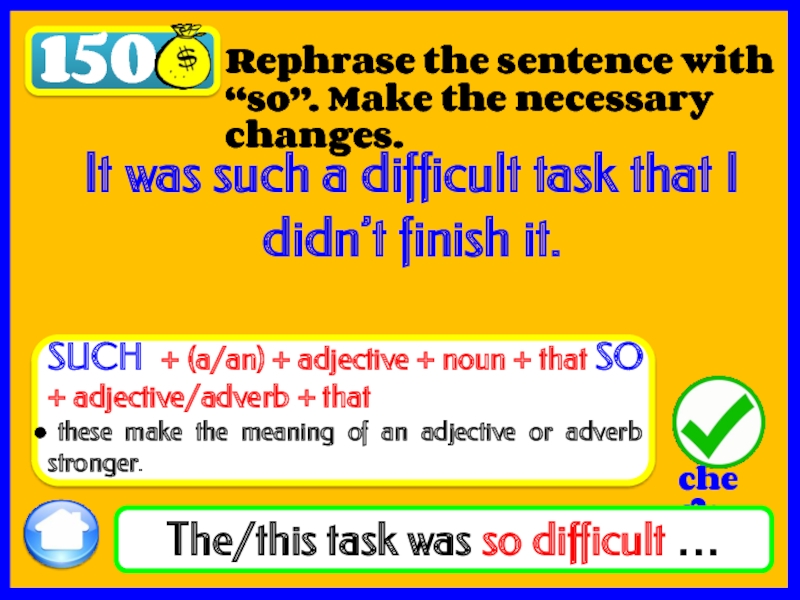- Главная
- Разное
- Дизайн
- Бизнес и предпринимательство
- Аналитика
- Образование
- Развлечения
- Красота и здоровье
- Финансы
- Государство
- Путешествия
- Спорт
- Недвижимость
- Армия
- Графика
- Культурология
- Еда и кулинария
- Лингвистика
- Английский язык
- Астрономия
- Алгебра
- Биология
- География
- Детские презентации
- Информатика
- История
- Литература
- Маркетинг
- Математика
- Медицина
- Менеджмент
- Музыка
- МХК
- Немецкий язык
- ОБЖ
- Обществознание
- Окружающий мир
- Педагогика
- Русский язык
- Технология
- Физика
- Философия
- Химия
- Шаблоны, картинки для презентаций
- Экология
- Экономика
- Юриспруденция
spin-the-wheel-grammar-revision-game-for-higher-le-activities презентация
Содержание
- 1. spin-the-wheel-grammar-revision-game-for-higher-le-activities
- 2. Team 1 Team 2 Team
- 3. 100 Rewrite the following in
- 4. 50 I’m sorry I
- 5. 200 Although he has a
- 6. 150 If she had any/more
- 7. 250 1) Sam, who is my
- 8. 150 He is being offered a
- 9. 200 1) 2) and 4) Which
- 10. 50 PRESENT SIMPLE vs
- 11. 250 Rephrase the following. …if she
- 12. 150 … to call me a
- 13. 100 has been living Complete the
- 14. 250 better / more confident Change
- 15. 150 Can/may I take the day
- 16. 50 was having / rang
- 17. 150 Rephrase the following with “so
- 18. 200 He is said to speak
- 19. 250 … did I know where
- 20. 250 He is thought to have
- 21. 100 Will Kate be back soon?
- 22. 50 have met / didn’t
- 23. 200 If he hadn’t been late,
- 24. 100 SUBJECT QUESTIONS - Ask
- 25. 200 I … (finish) this
- 26. 250 Rephrase the following. …
- 27. 150 Rephrase the sentence with
Слайд 2
Team 1
Team 2
Team 3
Team 4
Team 5
Team 6
SCORE
50
100
200
150
250
150
200
50
250
150
100
250
150
50
150
200
250
250
100
50
200
100
200
250
150
T
H
E
E
N
D
CLICK TO SPIN
Слайд 3
100
Rewrite the following in the PASSIVE VOICE.
A lot of tea
People drink a lot of tea in England.
GENERAL RULES
●The direct object of the active becomes the subject of the passive. ●We add the verb “to be” right before the main verb (it takes the form of the main verb in the active voice) ●The main verb changes into the past participle.
Слайд 4
50
I’m sorry I can’t help you.
I wish …
I wish I
Rewrite the following. Make any necessary changes.
wish / if only + PAST SIMPLE
Used to express a present wish for things to be different.
Слайд 5
200
Although he has a bad temper/ he is bad-tempered, …
Rephrase the
In spite of his bad temper, he has many friends.
IN SPITE OF/DESPITE + ing or noun
ALTHOUGH + subject + verb
Слайд 6
150
If she had any/more friends, she wouldn’t feel (so) lonely.
Rewrite
She has no friends. She feels lonely.
CONDITIONALS TYPE 2 (used for unreal, impossible, imaginary, hypothetical… situations in the present)
●if clause + past simple ●main clause + would/could + infinitive
Слайд 7
250
1) Sam, who is my best friend, is sitting over there.
Which sentence is correct?
Sam, who is my best friend, is sitting over there.
Sam, that is my best friend, is sitting over there.
Sam who is my best friend is sitting over there.
NON-DEFINING RELATIVE CLAUSES
These are placed between commas because they give additional information about a person/thing
(we cannot use “that” in these clauses)
Слайд 8
150
He is being offered a new position.
Rewrite the following as started.
They
He …
IDIOMATIC PASSIVE VOICE
● In this case the indirect object of the active becomes the subject of the passive. However, you can start with the direct object – A new position is being offered to him.
Слайд 9
200
1) 2) and 4)
Which options are possible?
“He suggested …
Reporting statements with
+ ing
+ that + S + past simple
+ that + S + should + infinitive
staying at home.”
that we stayed at home.”
to stay at home.”
that we should stay at home.”
stay at home.”
Слайд 10
50
PRESENT SIMPLE
vs PRESENT CONTINUOUS
am working / don’t interrupt
I …
PRESENT CONTINUOUS am/is/are + ing for temporary situations, actions happening now, future plans… PRESENT SIMPLE for general truths /statements, permanent situations, routines, timetables…
Слайд 11
250
Rephrase the following.
…if she knew where he had gone.
Do you know
I asked Jane …
REPORTING QUESTIONS
●word order: reporting verb + if/question-word + subject + verb (since it’s no longer a question we don’t use do)
● When reporting someone’s words we usually move one tense further into the past.
Слайд 12
150
… to call me a taxi.
Report the following.
Shall I call you
She offered …
Promises, orders, offers, requests ... are often reported using to infinitive (with verbs like agree, ask, beg, decide, demand, invite, offer, order, promise, refuse, remind, tell, threaten, warn...)
Слайд 13
100
has been living
Complete the sentence with the PRESENT PERFECT CONTINUOUS.
Cindy …
FORM: has/have + been + ing
For actions that started in the past and have continued up till now (stresses “how long”) or have just finished (stresses the result - He has been running (he is all sweaty)
Слайд 14
250
better / more confident
Change the words in brackets to complete each
The … (good) he does, the … (confident) he feels.
the + comparative (S + verb), the + comparative (S + verb)
●used to show that two things change together or that one thing depends on the other.
Слайд 15
150
Can/may I take the day off?
Rephrase the following using a suitable
Am I allowed to take the day off?
CAN/MAY Modal verbs are auxiliary verbs with a great variety of communicative functions - in this case we are asking for permission.
● they are followed by the bare infinitive (except “ought to”)
Слайд 16
50
was having / rang
I … (have) dinner when the phone
PAST CONTINUOUS: was/were + ing
(for temporary actions in progress in the past)
PAST SIMPLE: arrived (regular) / left (irregular)
(for finished past actions)
PAST SIMPLE vs
PAST CONTINUOUS
Слайд 17
150
Rephrase the following with “so that”.
I’m moving to the city so
I’m moving to the city to have a better life.
PURPOSE CLAUSES
so that + subject + modal verb + infinitive
(we use “so that” instead of “to, so as to, in order to” when we repeat the subject or have two different subjects)
Слайд 18
200
He is said to speak 8 languages.
ALTERNATIVE PASSIVE VOICE – Rewrite
People say that he speaks 8 languages.
●It is said that he speaks 8 languages.
or
●He …
When talking about what people say, believe, think … we can use 2 structures:
● It + passive + that-clause
● Subject + passive + to infinitive
Слайд 19
250
… did I know where I was.
Rephrase the following.
I hardly knew
Hardly …
INVERSION OF THE SUBJECT (used after restrictive/negative adverbs to put enphasis on what we are saying) ● If these are put at the beginning of a sentence, the subject must follow the verb as in a question – remember to use do for the present and past simple
Слайд 20
250
He is thought to have stolen the diamond.
ALTERNATIVE PASSIVE VOICE –
People think that he stole the diamond.
●It is thought that he stole the diamond.
or
●He …
IMPERSONAL REPORT STRUCTURES
When reporting a past action we use:
● Subject + passive + perfect infinitive (to have + past participle)
Слайд 21
100
Will Kate be back soon?
QUESTIONS
Ask me …
Whether Kate will be
(wh-) + verb + S + (verb(s)) …
With auxiliary verbs and modal verbs we simply invert the word order: Have you seen Mike? Can I come in?
When there is no auxiliary verb, we need to use “do”: do(es)/did + S + infinitive: Why did he arrive late?
Слайд 22
50
have met / didn’t see
I … (meet) Jane twice this
PRESENT PERFECT: has/have + past participle
(for indefinite/unfished past actions) focuses on the action/result
PAST SIMPLE: arrived/left didn’t arrive/leave
(for definite or finished past actions) focuses on “when”
PRESENT PERFECT
vs PAST SIMPLE
Слайд 23
200
If he hadn’t been late, he would have got the job.
Rewrite
He didn’t get the job because he was late.
CONDITIONALS TYPE 3 (past situations)
- For things we usually regret but can’t change anymore
●if clause + past perfect (had + past participle)
●main clause + perfect conditional (would/could have + past participle)
Слайд 24
100
SUBJECT QUESTIONS - Ask the question for the underlined part of
Who loves Juliet?
Romeo loves Juliet.
When asking about the subject of a sentence, we do not invert the word order or need to use “do”. “The car is in the garage” – What is in the garage?
Слайд 25
200
I … (finish) this by the time you get back.
will have
Complete the sentence with the FUTURE PERFECT.
FORM: will have + past participle
For actions that will happen / be completed by a certain time in the future:
It is often used with a time expression using by + a point in future time (then, the time...)
Слайд 26
250
Rephrase the following.
… being disturbed at work.
I don’t like to be
I can’t stand …
can’t stand + gerund
Other expressions take the gerund as well: can’t bear, can’t help, it’s no good/use, it’s (not) worth…
Слайд 27
150
Rephrase the sentence with “so”. Make the necessary changes.
The/this task was
It was such a difficult task that I didn’t finish it.
SUCH + (a/an) + adjective + noun + that SO + adjective/adverb + that
these make the meaning of an adjective or adverb stronger.


